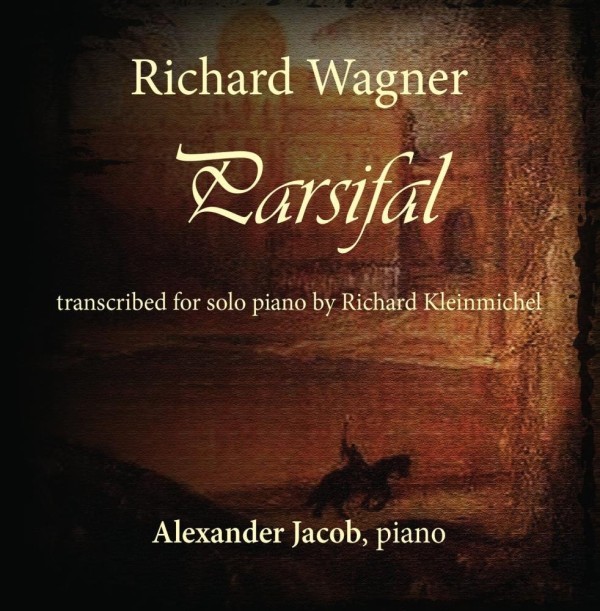Alexander Jacob – Richard Wagner: Parsifal
Richard Wagner: Parsifal
Richard Kleinmichel (transcription), Alexander Jacob (piano)
Numen Media, 2015, $19
Parsifal grew from the fertile brain of Richard Wagner, who adapted ancient German subjects into his popular and extremely accessible operas in the late 19th century. An adherent of German romanticism, Wagner enjoyed plucking heroic tales from the Teutonic past and transforming them into an ode to the Germanic spirit, making Wagner extremely popular with German nationalists from Houston Stewart Chamberlain to Adolf Hitler as well as audiences worldwide from Berlin to San Francisco and Tel Aviv.
Parsifal is taken from the minnesinger Wolfram Von Eschenbach’s tales of the Grail knights and their quest for that great symbol of religious enlightenment. Opposing the character Parsifal is the wicked magician Klingsor, a man so overcome by passions that he has castrated himself to remove the distraction. Parsifal is the pure youth, the personification of innocence and virtue, such that he cannot, at the beginning of the opera, recall his own name. The musician captures this innocence beautifully as she teases the youth into the scene, by chance as much as not.
Alexander Jacob’s music builds beautifully during the prelude to Scene I, where the grail knights have assembled to pray. As the score fades into the boy with his bow, and closing portions of the body and closing portions of Scene I, the tension is maintained by a soft hum of key strokes, deep and persistent, which are offset by the sharper keys forward. As the knights accept the youth Parsifal into their brotherhood, and the light of the Grail is revealed to him, the piano becomes contemplative, resounding, eternal. One is moved, imagining the mustachioed men in their keep.
As Parsifal arrives at the castle of magician Klingsor, the evil sorcerer sets a succubus to tempt the youth. Jacob’s score becomes busier, lilting softly through faster and more delicate keystrokes, musically imitating the scheming and evil mind of Klingsor. As Parsifal slips through the garden of delights unseduced, one can almost feel the beating of his heart in the persistent rhythm of the music. The seductress, Kundry, cannot seduce the youth, Parsifal, and as the magician casts the Holy Spear that pierced the side of Our Lord at the youth, a magical force intervenes and Parsifal catches it, and the castle of Klingsor crumbles into naught.
Many years later, the story continues, the Grail knights grown old. Jacob’s music continues, cautiously, his skilled fingers picking through what sounds like personally enchanting melodies on the keys. A helmeted figure arrives, bearing the spear that killed Our Lord, and it is revealed, many years later, to be Parsifal, who has never used the holy weapon to strike in anger. Deep wells of emotion arise through the score as Parsifal and the knights baptize the succubus and pray to the Lord on Good Friday. The spirit of renewal seems to pass through Jacob’s fingers; spring seems as fresh, as youthful, as it ever could. Twinkling sounds echo, everywhere.
The finale of Parsifal is no letdown. As the knight, Parsifal, pardons the grandmaster of the Grail knights for his unmentionable sin, converts the succubus, and reveals Die Graal, high overhead, for all to see. The music becomes prosaic, relaxed, as it must be for a penitent priest. The crystalline stokes of Jacob’s hands lead us through Parsifal’s baptism of the whore, to his revelation of the Grail, this final bit of wisdom- her expert hands making the terrifying journey of a knight errant seem a happy, untroubled place.
Some might contend that a Wagner opera requires a violent, exaggerated score. A man holds in his mind the score from the Flight of the Valkries. Richard Kleinmichel, who transcribed these excerpts from Parsifal to piano, however, has been able to relax out of an ancient tale of pure youth obtaining the highest spiritual accomplishments. Interpreting that scroll, the fingers of Alexander Jacob tap out the feeling of nervousness, accomplishment, and ultimately, victory through God, which is what Parsifal ultimately is, evidenced by the succubus turning into a white swan at the end of the opera.
I would highly recommend Richard Wagner: Parsifal as an interpretation of Parsifal for who seek to understand the meaning behind the Wagner opera and have inquiring minds. It transfers the bombast and grandiosity of opera into a personal narrative, both background like ambient music and intensely melodic, creating a world which immerses the listener in the feeling of both the ancient tales and the powerful opera, but does so unobtrusively like memories of a dream.










